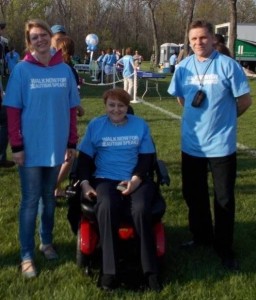As the U.S. Department of State focuses increasing attention on promoting the rights of people with disabilities, the State Department’s International Visitor Leadership Program (IVLP) is seeing increasing numbers of participants studying this topic. The implementation and design of exchange projects on disabilities policy, some with participants with disabilities, have unique logistical and administrative needs and require a high degree of skill, creativity and sensitivity. This article provides IVLP programmers and associated colleagues with a framework for providing disabled participants the same productive (and fun) experience as others.
As the United States prepares to commemorate the 25th anniversary of the passage of the Americans with Disabilities Act (ADA) later this summer, the rights of people with disabilities have taken center stage in the U.S. Foreign Policy agenda. Secretary of State John Kerry previewed the groundbreaking anniversary in December, 2014 when he commented on the occasion of the International Day of Persons With Disabilities, speaking of the ADA:
That historic, bipartisan legislation has played a huge role in making our country more accessible. It raised the expectations of people with disabilities about what they can hope to achieve at work and in life. It inspired the world to view disability issues through the lens of equality and opportunity. And thanks to the ADA and other laws, nearly one in five Americans are now protected from disability-based discrimination….The way we treat people of all backgrounds demonstrates our values and defines who we are. That’s our greatest export, and on this International Day of Persons with Disabilities, we renew our determination to make sure that we leave no one behind — anywhere.
One result of the increased focus on disability policy at the U.S. Department of State has been an increase in International Visitor Leadership Program (IVLP) projects on this topic. These programs require a high degree of skill, creativity, and sensitivity as some invited participants arrive with disabilities around which it is often challenging to program. This article aims to provide all IVLP programmers and associated colleagues with a framework within which to provide visitors with disabilities the same productive (and fun) experience as other visitors. Below are a few logistical and programmatic best practices, tips, and suggestions:
Logistics: Proposal preparation requires that the following key concerns be addressed:
▪ Accessibility of hotels, ground transportation, home hospitality hosts and cultural events; associated costs of special accommodations
▪ Pacing of the program
▪ Requirements for interpreters/liaison officers throughout each particular program segment

Best practices: Borrowing from the recent experiences of three Professional Exchanges Division (PED) program teams, following are some “lessons learned:”
▪ Know the issues facing people with disabilities and the organizations working to address legal rights, healthcare, employment, and services
▪ Promote and facilitate inclusion of people with disabilities at all levels
▪ Remember that the IVLP is promoting cross-disability awareness
▪ Consider inclusion of a disabilities-related component in all programs
Resources: Below are some national organizational resources that can be very useful in the investigation of national issues, as well as concerns at state and local levels:
▪ National Council on Independent Living (NCIL)
▪ State Independent Living Councils (SILC)
▪ The Arc
▪ National Disability Rights Network
▪ Self-Advocacy Networks
▪ ADA Regional Technical Assistance Centers
The IVLP will see an increasing numbers of disabilities programs in the coming months. These programs offer exciting opportunities for strengthening relationships with the disability community and to promote international networks that will improve programs and services for people on a worldwide level. It will be important to work increasingly collaboratively in order to insure an inclusive, comfortable and rewarding experience for IVLP visitors with disabilities. For additional helpful information and advice on programming, visit Mobility International’s National Clearinghouse on Disability & Exchange.
















